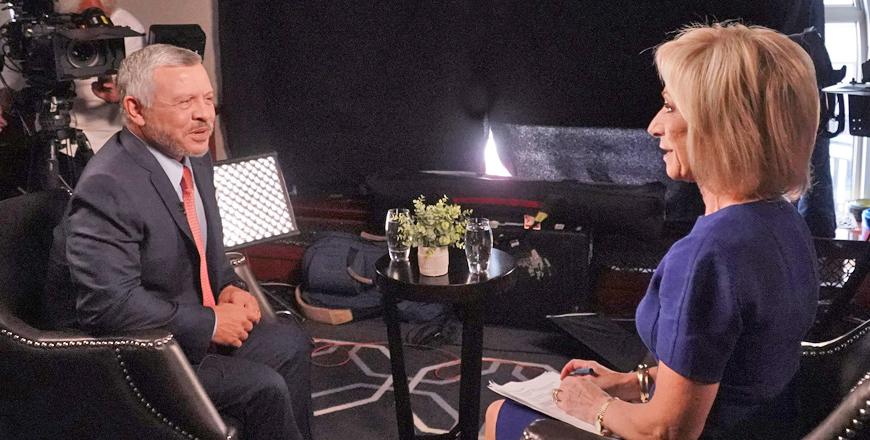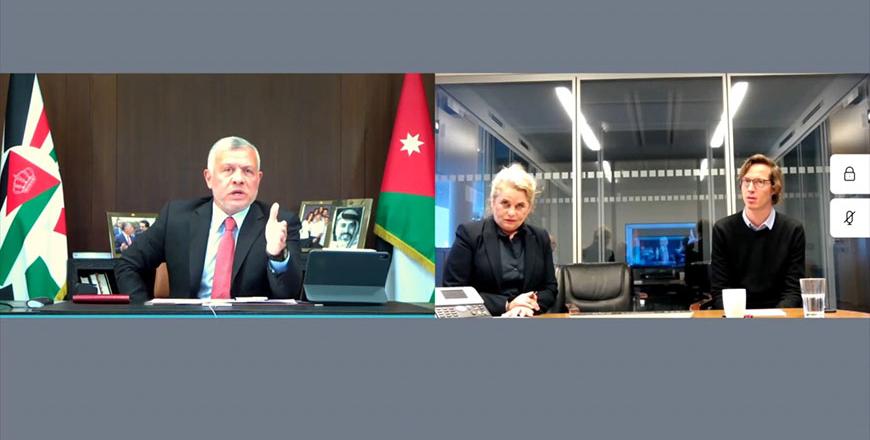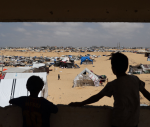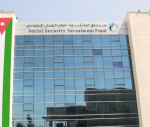You are here
One-state solution a disaster to region, including Israel — King
Sep 28,2018 - Last updated at Sep 28,2018
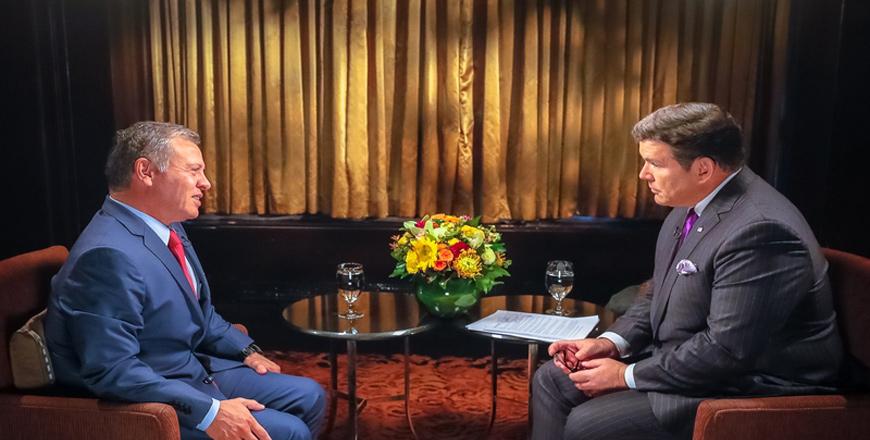
His Majesty King Abdullah speaks to Fox News’ Bret Baier in an interview the network aired on Wednesday (Photo courtesy of Royal Court)
NEW YORK — His Majesty King Abdullah has said that a one-state solution to the Middle East conflict is a disaster “for all of us in the region including Israel”.
In an interview with Fox News’ “Special Report”, broadcast on Wednesday night His Majesty King Abdullah told the host, Bret Baier, who is the channel’s chief political anchor, that Iran seeks “to be as close to the Mediterranean as possible, so they are going to do all efforts to continue to be in those areas and to be a mischief-maker”.
On terror, His Majesty said Daesh has been defeated in Syria and Iraq but not destroyed, stressing that the ideological war on extremists would last for decades.
Following is the full text of the broadcast interview as provided by Royal Court:
Bret Baier: King Abdullah of Jordan is urging the United Nations to continue humanitarian funding for Palestinians, and is asking for help for Jordan with refugees. The King, making his appeal at the UN General Assembly Tuesday.
It comes after President Trump cut off $350 million in aid for the UN agency that distributes the funding.
I talked with King Abdullah about his relationship with President Trump, and the continued unrest in the Middle East.
He sat down with me to give us an assessment of his region.
King Abdullah: Well, where do you want to begin? I think that’s the problem; at all points of the compass, we still have challenges. Syria to an extent, ISIS is defeated, not destroyed, and you can apply that to Iraq also. But how do we move the political process in Syria? How do we stabilise? This is something that we can get into; relatively calm in the south, because there’s a crisis management centre that is operated by the Russians and Americans in Jordan, hosted by us for de-confliction, we are looking to make the south better. Iraq is still going through some of its turmoil. Obviously, as the government settles down, we want to make sure that, you know, the national military is all-encompassing and a building block to move to the future. We have the Israeli-Palestinian issue to our west, Yemen to our south, so, you know, we have to be light on our feet, and there is a lot of balls being juggled in the air.
Baier: That is a busy neighbourhood. On the ISIS front, the large perception was that they have been destroyed largely, but there seems to be either a comeback or an ideological kind of upbringing for young people.
King Abdullah: Let’s keep in mind; we are calling these people ISIS or Daesh. They are no different than Al Qaeda, Al Shabab, Boko Haram or any other group out there. So, this is a global problem, they are the most used names because they are the most vicious and most violent, but that doesn’t mean that all those groups are any different from each other. So, today we are talking about ISIS, you know, four, five years from now maybe there is another name that is developed and may become even worse. There is two stories in Syria and—to an extent—two stories in Iraq; one is the countries are moving forward and redeveloping themselves and calming down, but there is still a fight against insurgents.
Baier: You have concerns about the peace process and recent moves?
King Abdullah: Well, look, the president from day one was committed to a fair and balanced deal for the Israelis and Palestinians to move the process forward. We’re not too sure what the plan is; that’s part of the problem. So it’s more difficult for us to be able to step in and help. What I’m worried about is to go from the two-state solution to a one-state solution, which is a disaster for all of us in the region including Israel.
If most of the final status issues have been taken off the table, then you can understand Palestinian frustration, so how do we build the bridges of confidence between the Palestinians and the United States? Because whatever people say, you cannot achieve a two-state solution or peace deal without the role of Americans. So, at the moment, the Americans are speaking to one side and not speaking to the others, and so that is the impasse that we’re at.
Baier: President Trump is, if he’s anything, he is pretty blunt.
King Abdullah: So exactly, and I think that’s the breath of fresh air. The president sort of, as I said, “look, if we go to the one-state solution, here are the problems that we are all going to face”, and he was like, “wait a second”, and he went from A to Z like that. And I’m like, OK, fantastic. He went straight through the problem, came to the solution, and we looked at each other and said “OK, you know, we need to work on the two-state solution”.
The one state-solution, I think, is a major problem for how Israel presents itself, and internally how it presents itself, because the reality is that we’re talking about apartheid. And that, I think, there’s a lot of supporters of Israel outside of Israel that are really concerned: Are they heading in the right direction?
Now, can we get the two-state solution on track? Can we find an amiable and fair solution between the two others? Because the one-state solution frightens the heck out of all of us.
Baier: Last time we talked, the region was in turmoil, ISIS was on the rise in 2015. The other thing we talked about back then was Yemen.
[King Abdullah in 2015: I would humbly suggest the quicker we find a political situation to that issue, the better.]
King Abdullah: I still believe that’s the case.
Baier: We’re three years later.
King Abdullah: We’re three years later. It is a very difficult campaign and the quicker that all of us get to a political solution, I know that the Saudis and the UAE are working very hard. We have to keep in mind that there is concern over the humanitarian crisis, which I think is still unfolding. The UAE have been really leaning forward in trying to bring as much relief supplies as possible to the Yemenis, but unless we can get the parties together and find a political solution, this is going to continue to be a black hole for all of us, I think.
Baier: Iran is obviously active in Yemen, they’re funnelling money and weapons—
King Abdullah: In many other places in the region.
Baier: Through your eyes, how does Iran look?
King Abdullah: You can see Iranian signature, or what I see the Iranian Crescent, whether it’s in Iraq, whether it’s in Syria, whether it’s in Lebanon, you mentioned Yemen, we’re seeing them in the Horn of Africa.
Baier: Is there a way to get Syria to a political solution?
King Abdullah: So, we’re working on things. I mean, sometimes the policy changes by certain people in American institutions that sort of throw us off a bit. Having said that, we, the Americans and the Russians, we have the joint command centre in Jordan that helps in de-confliction. We do have a strategy. You know, we had agreements with the Russians and the regime on dealing with the Iranians; that’s had a slight hiccup in the past couple of weeks, but I’m expecting, hopefully, that to come back into the right fold. And as I said, we are all working and understanding that the Iranians are not helping anybody, but, again, from an Iranian point of view, they want to be as close to the Mediterranean as possible, so they are going to do all efforts to continue to be in those areas and to be a mischief-maker.
Baier: In your country, 20 per cent of the population, now, refugees?
King Abdullah: Twenty-one per cent only Syrian refugees; that’s not to count almost a million illegal Egyptian workers that are in our country, that we took a decision many years ago not to send back to Egypt, because it would destabilise their economy. So that’s the right thing, although the difficult thing. Couple of a hundred thousand Iraqi refugees that are in our country, and a total of about 50 to 60 thousand Yeminis and Libyan refugees.
Baier: So, what kind of pressure does that put on—
King Abdullah: Tremendous; 21 per cent of our population increased in a couple of years. That’s like 60 million Canadians just appearing on your border, in a period of two or three years, and then you’ve got to take, when you first started, at least a quarter of your budget for a couple of years just to look after your guests.
Baier: Say that again: 60 million if you look at the US.
King Abdullah: Yes, 60 million Canadians coming over in two to three years.
Baier: And you’ve got to deal with them?
King Abdullah: And you’ve got to deal with them. And the international community is helping, and the biggest supporters are the United States and Europe. But as of this year, 2018, we are only getting 16 per cent of the support from the international community. That means that we have to borrow the rest from the international community just to fund the Syrian refugees.
Now, we do have to reform, we do have to become self-sufficient. But donor fatigue is a major problem, and it’s an international responsibility. I mean, if you look at how many refugees Europe has taken and see the role that Jordan has done, we’re actually taking the load off a lot of other countries, but help us because we’re doing the right thing.
Baier: So, some people in the US would say, you know, you got a bunch of rich countries there, Saudi Arabia, the UAE, oil rich countries, are they chipping in?
King Abdullah: We hope that they can do more. The UAE has built refugee camps in Jordan and supported the refugees, but we are in discussion with them to see whether they can help us a bit more because of these challenges.
Baier: What do you tell your kids about the future?
King Abdullah: We’re in a very chaotic world today where there are enemies of us all, and specifically these extremist groups we call the khawarej, the outlaws of Islam. This is an issue that’s going to be with us for the next 10-15 years. So whether we like it or not, this is an international fight, I’ve called it a Third World War by other means, which is going to be with us for, unfortunately, about a decade or two. I hope the military aspect is going to be short, but then it’s the ideological aspect that we are going to have to fight over the next 10-15 years.
Baier: Your Majesty, we appreciate your time.
King Abdullah: Most welcome, sir.
Baier: Thank you, very much.
Related Articles
Following is the full transcript of the interview with His Majesty King Abdullah broadcast on MSNBC on Monday: Andrea Mitchell: This mo
AMMAN — German magazine Der Spiegel published on Friday an interview with His Majesty King Abdullah that covered the latest developments in
AMMAN — His Majesty King Abdullah spoke to CNN’s Fareed Zakaria in a wide-ranging interview that was conducted in Washington, DC, and aired


